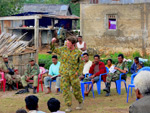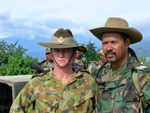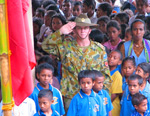Languages Champions

|

|

|
Major Michael Stone – Short Biography
Born into a military family in Canberra in 1977, Michael Stone was raised in many cities along the east coast of Australia and spent three of his early years in England. He completed his last four years of schooling at Marist College, Ashgrove in Brisbane www.marash.qld.edu.au. Michael graduated from the Australian Defence Force Academy www.defence.gov.au/ADFA in December 1998 with a Bachelor of Arts degree. Upon graduation from Royal Military College, Duntroon in December 1999, Michael deployed immediately to East Timor to join the Second Battalion, Royal Australian Regiment (2 RAR) as part of INTERFET. He re-deployed to East Timor under the United Nations mission UNTAET www.un.org/peace/etimor/etimor in 2001. Following this, Michael had two Training Command appointments where he fulfilled numerous roles at the Army Recruit Training Centre, Wagga Wagga and in officer training at the Queensland University Regiment.
Michael was promoted to Major in September 2004 on his return to East Timor as part of the Defence Cooperation Program. He was the commander of a small specialist unit, advising and training the isolated First Infantry Battalion largely composed of ex-Falintil guerrilla resistance fighters. In January 2006 he was transferred to the East Timorese Defence Force Headquarters advising the Defence Chief, Brigadier General Ruak, on the development of operational and training structures.
In May 2006, as East Timor descended into civil crisis, Michael assumed various roles as spokesman for the International Forces and negotiator, mediator, arbitrator and key liaison between International Forces and Timor Leste stakeholders. Michael operated across every district of East Timor, communicating with villagers, police, military and Government administration. In Dili, Michael’s efforts were focused to help broker dialogue, forums and negotiations for peace. Michael regularly appeared on Timorese television, speaking in the native language, as an announcer of nightly security broadcasts and on panel-hosted current affairs shows encouraging peace. He provided specialist advice and input in various forums for the United Nations mission, non-governmental organizations and other stakeholders.
Michael speaks fluent Tetum/n, the Timorese national language, basic Portuguese and elements of a number of dialects. He continues to study a Masters of Management part-time through the University of New South Wales www.unsw.edu.au. Currently, Michael is the personnel officer for the Capability Implementation Team for the raising of an infantry battalion in Brisbane.
Major Michael Stone – Quotes
There is no faster and more conclusive way to prove to a foreigner that you are dedicated and truly interested in them than speaking their language. There are few skills that have such value in today’s global marketplace.
I have learnt that to be peacemakers, we need to be able to communicate the message of peace - to listen and be heard by others in their language.
We can make a difference in our world if we come to know other people’s cultures, languages and needs. Armed with a foreign language you can cross barriers, breach obstacles and bridge gaps that others cannot.
Language skills form the foundation for ‘relationship building’, life’s greatest skill and ‘force multiplier’.
Many of the world’s problems could be dealt with peacefully if we had the skills to listen to each other. Learning each other’s Languages is critical in this regard.
Mastering communication is more than just learning language vocabulary and grammar; communication involves listening, understanding, interpreting body language and being able to articulate your intent. Learning a foreign language helps take these skills to a new level.
I regret never studying a foreign language at school. There is no other skill that has been as valuable and satisfying in my life as learning and speaking another language.
Having the ability to speak a foreign language is holding a passport to global opportunities in Australia and overseas. It continues to astound me the amount of work and adventure that speaking another language brings to your life.
We all live in one world, sometimes separated by language and culture. You can bring the world closer by learning a language.
A foreign language is a skill that can be with you for life.
Learning a foreign language is so much more than just learning to communicate; it opens your eyes to a different world, opens your mind to new ideas, opens your life to new family and friends and opens the door to opportunities.
If you seek adventure and excitement on top of success, a foreign language gives you a significant edge in the competitive global skills market. Imagine being able to travel the world, meet fascinating people, make great friends and be well paid for it.
We need people in trade, diplomacy and security sectors that can connect us with the world.
In a globalised world, the demand for intercultural and language skills will continue to grow.
I have found that there is no greater enabler in foreign negotiation than the mastery of another person’s language.
Learning a foreign language is fun and an impressive skill if you choose to practise and utilise it.
Opportunities to work and travel around the world have never been greater than they are now. Opportunities to capitalise on language skills for your personal and professional life have never been better.






